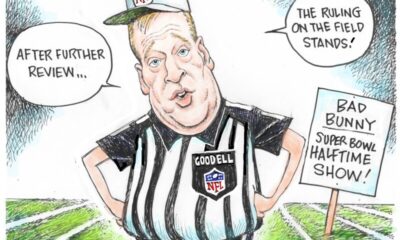Business
Former Commerce Secretary Warns of Market Turmoil Over Tariff Ruling

Former Commerce Secretary Wilbur Ross has raised concerns about potential market instability if the U.S. Supreme Court decides to strike down tariffs imposed during the administration of former President Donald Trump. Ross, who oversaw tariff policy throughout Trump’s first term, emphasized that a ruling against these tariffs would likely create significant confusion in financial markets.
During a recent interview, Ross indicated that uncertainty would dominate investor sentiment. “If the Supreme Court ruled against the administration, I think there would be a tremendous amount of confusion in the securities market and in trade,” he stated. With businesses uncertain about the future, many may hesitate to adjust their supply chains, leading to further complications. “What do you do? Do you stop? Do you continue? Do you reverse course?” Ross questioned, highlighting the precarious position businesses may face.
The Supreme Court recently heard arguments regarding the legality of the tariffs, which were imposed under the International Emergency Economic Powers Act. Solicitor General John Sauer defended these tariffs, arguing they are lawful, while various companies and states presented challenges to the policies. Ross remarked that he did not sense a strong inclination from the justices favoring the litigants’ position. He anticipated a split decision, suggesting that while some aspects of the tariffs might be overturned, it is unlikely the entire framework will be dismantled. “I would be very surprised if they knocked out the whole thing,” he added.
Ross pointed out that Trump and his administration have consistently argued that eliminating these tariffs could harm the economy. He believes the Supreme Court is considering the broader implications of such a ruling. “Given the tremendous chaos that would come from a negative ruling, I would be very surprised if you got a majority of the court to agree with that,” he noted.
The political landscape surrounding tariffs has shifted since Trump’s first term. Ross observed that congressional Republicans now exhibit greater support for tariffs, a departure from their traditional stance. This change is largely attributed to Trump’s influence, which has steered the party towards a more populist and protectionist ideology. Many former critics of tariffs, including notable figures like Pat Toomey, Paul Ryan, and Jeff Flake, have since retired or diminished their involvement in public policy.
“He is more powerful now than he was then,” Ross stated, referring to Trump’s current political standing. He emphasized that Congress has not demanded hearings regarding the tariffs, indicating a shift in the political dynamic that favors Trump’s policies. Ross expressed that the administration aims to implement tariffs comprehensively to avoid the complications seen during Trump’s initial term, where targeted tariffs led to transshipment issues.
In Trump’s previous term, there was significant ambiguity regarding the extent of executive power in imposing tariffs. Ross described it as a period of testing limits, where many tariffs were expected to face legal challenges. A notable difference between the two terms is the current administration’s elimination of the exclusion process, which allowed companies to apply for exemptions from tariffs. This process, while cumbersome, provided a formal mechanism for businesses to seek relief.
Ross defended the exclusion process, stating, “It was necessary to have a clear mechanism for resolving disputes.” He expressed confusion over the current administration’s decision to forego a similar process, indicating it represents a philosophical shift in trade policy.
As the Supreme Court deliberates on the future of these tariffs, the implications for the market and businesses remain uncertain. Ross’s insights underscore the potential for turbulence in the financial markets and the challenges that businesses will face in navigating the evolving landscape.
-

 Politics1 week ago
Politics1 week agoHamas Chief Stresses Disarmament Tied to Occupation’s End
-

 Science3 weeks ago
Science3 weeks agoResearchers Challenge 200-Year-Old Physics Principle with Atomic Engines
-

 Science1 week ago
Science1 week agoOhio State Study Uncovers Brain Connectivity and Function Links
-

 Entertainment1 week ago
Entertainment1 week agoMegan Thee Stallion Exposes Alleged Online Attack by Bots
-

 Top Stories1 week ago
Top Stories1 week agoFederal Agents Detain Driver in Addison; Protests Erupt Immediately
-

 Entertainment2 weeks ago
Entertainment2 weeks agoSyracuse Stage Delivers Lively Adaptation of ‘The 39 Steps’
-

 Top Stories1 week ago
Top Stories1 week agoOrioles Hire Craig Albernaz as New Manager Amid Rebuild
-

 World3 weeks ago
World3 weeks agoGlobal Military Spending: Air Forces Ranked by Budget and Capability
-

 Politics3 weeks ago
Politics3 weeks agoNHP Foundation Secures Land for 158 Affordable Apartments in Denver
-

 Top Stories2 weeks ago
Top Stories2 weeks agoWill Smith Powers Dodgers to World Series Tie with Key Homer
-

 Lifestyle2 weeks ago
Lifestyle2 weeks agoTrump’s Push to Censor National Parks Faces Growing Backlash
-

 Politics1 week ago
Politics1 week agoNFL Confirms Star-Studded Halftime Show for Super Bowl LVIII









